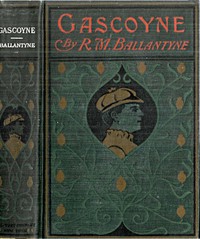Gascoyne, The Sandal-Wood Trader: A Tale of the Pacific by R. M. Ballantyne (classic reads .TXT) 📗

- Author: R. M. Ballantyne
Book online «Gascoyne, The Sandal-Wood Trader: A Tale of the Pacific by R. M. Ballantyne (classic reads .TXT) 📗». Author R. M. Ballantyne
The shades of night had begun to descend upon the island when Master Corrie reached the summit of the mountain ridge that divided the bay in which the Foam was anchored from the settlement of Sandy Cove.
Close on his heels followed the indomitable Jo Bumpus, who panted vehemently and perspired profusely from his unwonted exertions.
"Wot an object you are!" exclaimed Corrie, gazing at the hot giant with a look of mingled surprise and glee; for the boy's spirit was of that nature which cannot repress a dash of fun, even in the midst of anxiety and sorrow. We would not have it understood that the boy ever deliberately mingled the two things—joy and sorrow—at one and the same time; but he was so irresistibly alive to the ludicrous, that a touch of it was sufficient at any time to cause him to forget, for a brief space, his anxieties, whatever these might be.
Jo Bumpus smiled benignantly, and said that he "was glad to hear it." For Jo had conceived for the boy that species of fondness which large dogs are frequently known to entertain for small ones—permitting them to take outrageous liberties with their persons which they would resent furiously were they attempted by other dogs.
Presently the warm visage of Bumpus elongated, and his eyes opened uncommonly wide, as he stared at a particular spot in the ground; insomuch that Corrie burst into an uncontrollable fit of laughter.
"O Grampus! you'll kill me if you go on like that," said he; "I can't stand it,—indeed I can't. Sich a face! D'ye know what it's like?"
Jo expressed no desire to become enlightened on this point, but continued to gaze so earnestly that Corrie started up and exclaimed:
"What is it, Jo?"
"A fut," replied Jo.
"A footprint, I declare!" shouted the boy, springing forward and examining the print, which was pretty clearly defined in a little patch of soft sand that lay on the bare rock. "Why, Jo! it's Poopy's. I'd know it anywhere, by the bigness of the little toe. How can she have come up here?"
"I say, lad, hist!" said Bumpus, in a hoarse whisper; "here's another fut that don't belong to—what's her name,—Puppy, did ye say?"
"Why! it's Alice's," whispered the boy, his face becoming instantly grave, while an unwonted expression of anxiety crossed it; "and here's that of a savage beside it. He must have changed his intention; or, perhaps, he came this way to throw the people who were chasing them off the scent."
Corrie was right. Finding that he was hotly pursued, Keona had taken advantage of the first rocky ground he reached to diverge abruptly from the route he had hitherto followed in his flight; and, the further to confuse his pursuers, he had taken the almost exhausted child up in his arms and carried her a considerable distance, so that if his enemies should fall again on his track the absence of the little footprints might induce them to fancy they were following up a wrong scent.
In this he was so far successful; for the native settlers, as we have seen, soon gave up the chase, and returned with one of the child's shoes, which had fallen off unobserved by the savage.
But there was one of the pursuers who was far ahead of the others, and who was urged to continue the chase by the strongest of all motives,—love. Poor Kekupoopi had no sooner heard of the abduction of her young mistress than she had set off at the top of her speed to a well-known height in the mountains, whence, from a great distance, she could observe all that went on below. On the wings of affection she had flown, rather than walked, to this point of observation, and, to her delight, saw not only the pursuers, but the fugitives in the valley below. She kept her glowing eyes fixed on them, hastening from rock to rock and ridge to ridge, as intervening obstacles hid them from view, until she saw the stratagem, just referred to, practised by Keona. Then, feeling that she had no power of voice to let the pursuers know what had occurred, and seeing that they would certainly turn back on being baffled, she resolved to keep up the chase herself—trusting to accident to afford her an opportunity of rendering aid to Alice; or, rather, trusting to God to help her in her great difficulty; for the poor child had been well trained in the missionary's house, and love had been the teacher.
Taking a short cut down into the valley,—for she was well acquainted with all the wild and rugged paths of the mountains in the immediate neighborhood of the settlement,—she was so fortunate as to reach a narrow pass through which Keona and Alice must needs go. Arriving there a short time before they did, she was able to take a few minutes' rest before resuming the chase.
Little did the wily savage think that a pair of eyes as dark and bright, though not so fierce, as his own, were gazing at him from behind the bushes as he sped up that narrow gorge.
Poor Alice was running and stumbling by his side; for the monster held her by the hand and dragged her along, although she was scarcely able to stand. The heart of the black girl well-nigh burst with anger when she observed that both her shoes and stockings had been torn off in the hasty flight, and that her tender feet were cut and bleeding.
Just as they reached the spot near which Poopy was concealed, the child sank with a low wail to the ground, unable to advance another step. Keona seized her in his arms, and, uttering a growl of anger as he threw her rudely over his shoulder, bore her swiftly away.
But, quick though his step was, it could not outrun that of the poor little dark maiden who followed him like his shadow, carefully keeping out of view, however, while her mind was busy with plans for the deliverance of her young mistress. The more she thought, the more she felt how utterly hopeless would be any attempt that she could make, either by force or stratagem, to pluck her from the grasp of one so strong and subtle as Keona. At length she resolved to give up thinking of plans altogether, and take to prayer instead.
On reaching the highest ridge of the mountains, Keona suddenly stopped, placed Alice on a flat rock, and went to the top of a peak not more than fifty yards off. Here he lay down and gazed long and earnestly over the country through which they had just passed, evidently for the purpose of discovering, if possible, the position and motions of his enemies.
Poopy, whose wits were sharpened by love, at once took advantage of her opportunity. She crept on all fours towards the rock on which Alice lay, in such a manner that it came between her person and the savage.
"Missy Alice! O, Missy Alice! quick! look up! it's me—Poopy," said the girl, raising her head cautiously above the edge of the rock.
Alice started up on one elbow, and was about to utter a scream of delight and surprise, when her sable friend laid her black paw suddenly on the child's pretty mouth, and effectually shut it up.
"Hush! Alice; no cry. Savage hear and come back—kill Poopy bery much quick. Listen. Me all alone. You bery clibber. Dry up eyes, no cry any more. Look happy. God will save you. Poopy nebber leave you as long as got her body in her soul."
Just at this point, Keona rose from his recumbent position, and the girl, who had not suffered her eyes to move from him for a single instant, at once sunk behind the rock and crept so silently away that Alice could scarcely persuade herself she had not been dreaming.
The savage returned, took the child's hand, led her over the brow of the mountain, and began to descend, by a steep, rugged path, to the valleys lying on the other side of the island. But before going a hundred yards down the dark gorge—which was rendered all the darker by the approach of night—he turned abruptly aside, entered the mouth of a cavern, and disappeared.
Poopy was horrified at this unexpected and sudden change in the state of things. For a long time she lay closely hid among the rocks, within twenty yards of the cave's mouth, expecting every moment to see the fugitives issue from its dark recesses. But they did not reappear. All at once it occurred to the girl that there might possibly be an exit from the cavern at the other end of it, and that, while she was idly waiting there, her little mistress and her savage captor might be hastening down the mountain far beyond her reach.
Rendered desperate by this idea, she quitted her place of concealment, and ran recklessly into the cavern. But the place was dark as Erebus, and the ground was so rugged that she tripped and fell before she had advanced into it more than fifty yards.
Bruised by the fall, and overawed by the gloom of her situation, the poor girl lay still for some time where she had fallen, with bated breath, and listening intently; but no sound struck her ear save the beating of her own heart, which appeared to her unnaturally loud. Under an impulse of terror, she rose, and ran back into the open air.
Here it occurred to her that she might perhaps find the other outlet to the cave,—supposing that one really existed,—by going round the hill and carefully examining the ground on the other side. This, however, was a matter requiring considerable time, and it was not until a full hour had expired that she returned to the mouth of the cave, and sat down to rest and consider what should be done next.
To enter the dark recesses of the place without a light she knew would be impossible as well as useless, and she had no means of procuring a light. Besides, even if she had, what good could come of her exploration? The next impulse was to hasten back to the settlement at full speed and guide a party to the place; but, was it likely that the savage would remain long in the cave? This question suggested her former idea of the possible existence of another outlet; and as she thought upon Alice being now utterly beyond her reach, she covered her face with her hands and burst into tears. After a short time she began to pray. Then, as the minutes flew past, and her hopes sank lower and lower, she commenced—like many a child of Adam who thinks himself considerably wiser than a black girl—to murmur at her hard lot. This she did in an audible voice, having become forgetful of, as well as indifferent to, the chances of discovery.
"Oh! w'at for was me born?" she inquired, somewhat viciously; and not being able, apparently, to answer this question, she proceeded to comment in a wildly sarcastic tone on the impropriety of her having been brought into existence at all.
"Me should be dead. Wat's de use o'life w'en ums nothin' to live for? Alice gone! Darling Alice! Oh, dear! Me wish I wasn't never had been born; yes, me do! Don't care for meself! Wouldn't give nuffin for meself! Only fit to tend Missy Alice! Not fit for nuffin else. And now Alice gone—whar' to' nobody nose an' nobody care, 'xcept Poopy, who's not worth a brass button!"
Having given utterance to this last expression, which she had acquired from her friend Corrie, the poor girl began to howl in order to relieve her insupportable feelings.
It was at this point in our story that Master Corrie, and his companion the Grampus, having traced the before-mentioned footprints for a considerable distance, became cognizant of sundry unearthly sounds, on hearing which, never having heard anything like them before, these wanderers stood still in attitudes of breathless attention, and gazed at each other with looks of indescribable amazement, not altogether unmixed with a dash of consternation.
CHAPTER XI. A GHOST—A TERRIBLE COMBAT ENDING IN A DREADFUL PLUNGE."Corrie," said Jo Bumpus, solemnly, with a troubled expression on his grave face, "I've heer'd a many a cry in this life, both ashore and afloat; but, since I was half as long as a marlinespike, I've never heerd the likes o' that there screech nowhere."
At any other time the boy would have expressed a doubt as to the possibility of the Grampus having, at any period of his existence, been so short as "half the length of a marlinespike;" but, being very imaginative by nature, and having been encouraged to believe in ghosts by education, he





Comments (0)